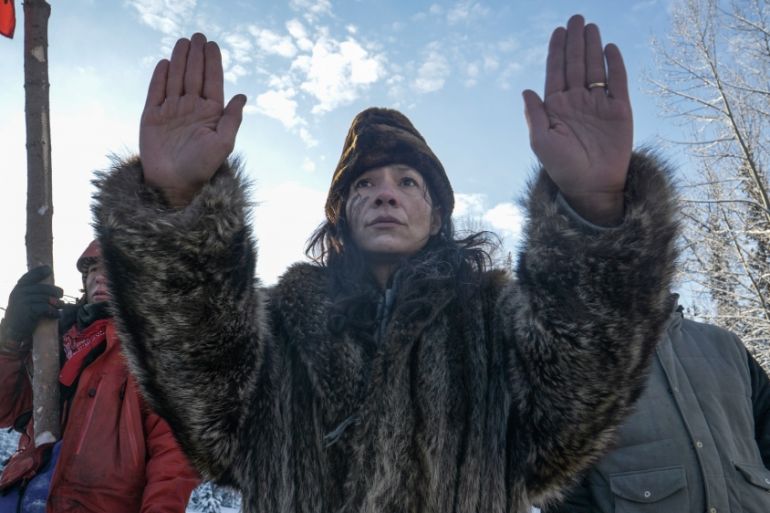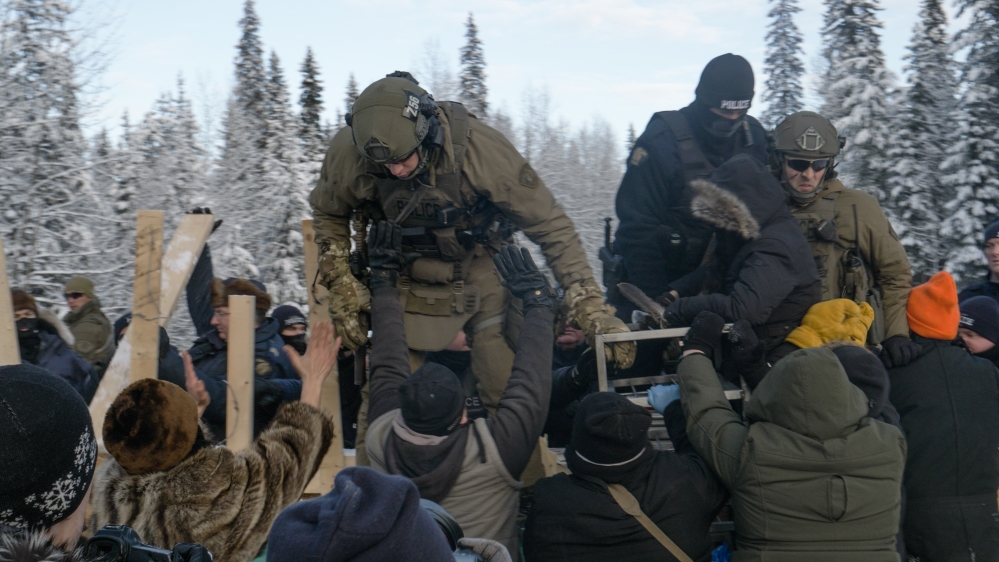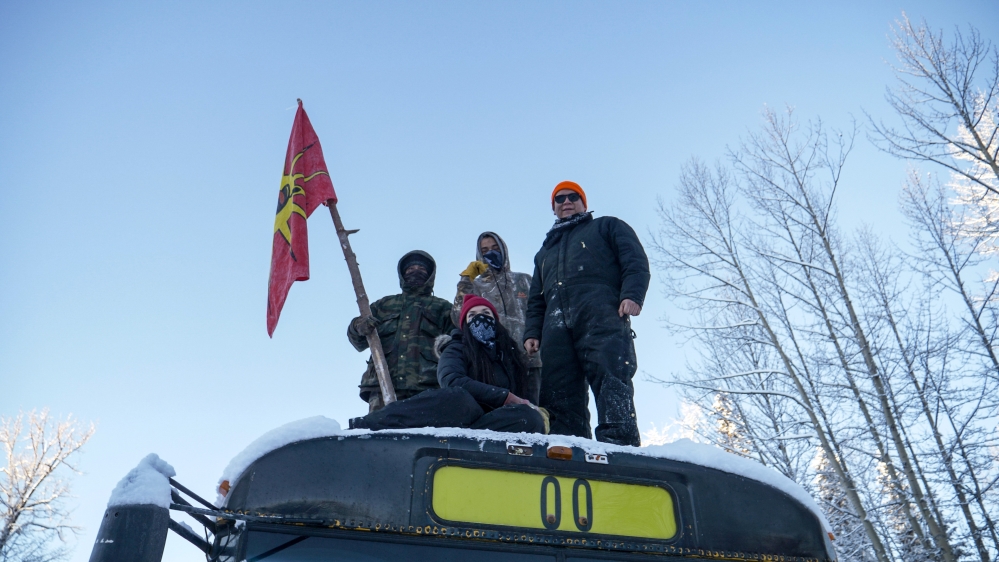A year after RCMP’s violent raid, Wet’suwet’en people fear repeat
Tensions rise as Wet’suwet’en leaders evict pipeline company from traditional territories in northern British Columbia.

Montreal, Canada – It has happened, it will happen again and Wet’suwet’en land defenders say it could be worse than before.
Canada’s federal police force, the Royal Canadian Mounted Police (RCMP), enforced an interim injunction in January 2019 against Wet’suwet’en group that had set up checkpoints and encampments on their traditional territories in northern British Columbia (BC) to block the construction of the contentious Coastal GasLink pipeline. That raid drew widespread criticism when it was recently revealed that the RCMP had authorised the use of lethal force to disperse the site.
Keep reading
list of 4 itemsPhotos: Indigenous people in Brazil march to demand land recognition
Holding Up the Sky: Saving the Indigenous Yanomami tribe in Brazil’s Amazon
Indigenous people in Philippines’s north ‘ready to fight’ as tensions rise
“They’re clearly willing to do whatever it takes to ensure that this pipeline gets built,” Wet’suwet’en land defender Sleydo’ (Molly Wickham) told Al Jazeera via phone.
Last week, a Canadian court granted an injunction to allow construction on the Coastal GasLink pipeline, prompting renewed fears of another violent raid.
The court’s ruling instructs those Wet’suwet’en land defenders to allow Coastal GasLink to have undeterred access to build on their ancestral lands.
Sleydo’ was there when heavily armed RCMP officers descended on the Gidimt’en Access Point, a checkpoint and encampment over 1,000km (621 miles) north of Vancouver, on January 7, 2019.
“It’s new to the rest of the world, but it’s definitely an ongoing experience and reality for us,” said Sleydo’, about the RCMP’s tactics.

The Guardian, citing RCMP strategy notes, reported last month that the federal police officers were instructed to “use as much violence toward the gate as you want” during the dispersal, and an RCMP officer said arrests would be needed for “sterilising the site”.
Sleydo’, the spokeswoman for the Gidimt’en checkpoint, said she saw RCMP officers move in with a chainsaw to try to tear down the gate.
“We were screaming and yelling for them to stop,” she told Al Jazeera. “You could just hear people screaming and yelling out in pain because their arms were about to be broken.”
Land rights
The 670km (416 mile) Coastal GasLink pipeline will cut across vast swaths of traditional Wet’suwet’en territory, transporting natural gas from northeast BC to a terminal near the town of Kitimat, where it will be prepared for export overseas.
The company behind Coastal GasLink, TC Energy (formerly TransCanada Corp), has reached agreements with 20 elected First Nation bands along the pipeline’s route, and the project has provincial permits to build. Construction activities began in early 2019.
But the pipeline has been met with staunch opposition from some members of the Wet’suwet’en Nation, including the hereditary chiefs who represent the community’s various clans.

The hereditary chiefs – who under Wet’suwet’en law hold decision-making power over the nation’s traditional territories – say that Coastal GasLink doesn’t have their “free, prior and informed” consent, a principle set out in the UN Declaration on the Rights of Indigenous Peoples.
In a landmark 1997 case that involved the Wet’suwet’en Nation, the Supreme Court of Canada also found that indigenous claims to their traditional territories had not been extinguished in the area.
On Saturday, the hereditary chiefs issued an eviction order to Coastal GasLink to vacate the area. “Over the past year, Coastal GasLink has operated on our territories despite our opposition to the project,” they said in a letter to the company.
“We must re-assert our jurisdiction over these lands, our right to determine access and prevent trespass under Wet’suwet’en law, and the right to Free Prior and Informed Consent … The denial of these rights has resulted in irreparable harm to the land and our people.”
The Wet’suwet’en lay claim to 22,000 square kilometres of land, an area roughly the size of the US state of New Jersey.
Another encampment set up to reclaim and defend traditional Wet’suwet’en lands in the area slated for pipeline construction is the Unist’ot’en Camp, which was established in 2009.
The camp sits about 20km (12 miles) from the Gidimt’en checkpoint, and it counts a healing lodge and bunkhouse, among other structures, said Freda Huson, the camp’s spokeswoman.
Huson said Wet’suwet’en law has largely been ignored in the ongoing dispute.
“They’ve pushed us off a majority of our 22,000 square kilometres as Wet’suwet’en people and the last two remaining territories my clan has left is the one we’re protecting right now,” said Huson about the camp.
“We’re not protesters and this is not a blockade,” she added. “It’s a reoccupation of our traditional lands.”
The raid
In its report, The Guardian said the RCMP during its January 2019 raid was prepared to use “lethal overwatch” – a term the newspaper said, citing an internal RCMP incident assessment, referred to an officer prepared to use lethal force – to dismantle the checkpoint in January of last year.
Sleydo’ told Al Jazeera she saw at least three police snipers during the raid; the officers were holding what she described as “heavy duty”, long-range weapons and they were watching everything through binoculars. Fourteen people were arrested that day.
“Knowing that they were watching every move and that they had these huge weapons to use on our people – it was traumatic,” she said.
Another RCMP document stated that with “no exception, everyone will be arrested in the injunction area”, The Guardian reported.
The threat of their extreme use of violence and force … hasn't gone away since the day of the raid. We're constantly under that threat and that pressure.
Shortly after the checkpoint was cleared, then-Coastal GasLink President Rick Gateman said the company was “thankful that a peaceful resolution has been achieved” that would allow it to begin construction on the project.
While the Gidimt’en checkpoint has since been re-established, Sleydo’ said RCMP officers regularly carry out surveillance activities and intimidate indigenous land defenders in the area.
“The threat of their extreme use of violence and force … hasn’t gone away since the day of the raid. We’re constantly under that threat and that pressure,” she said.
“The RCMP I believe have no problem doing exactly what they did on January 7 again,” Sleydo’ added. “Any time that injunction order comes down, we could be facing the exact same situation that we did – or worse.”
RCMP responds
The RCMP has faced a barrage of criticism since The Guardian’s report was published, with New Democratic Party (NDP) Member of Parliament Charlie Angus calling for an investigation into the allegations and indigenous leaders urging Prime Minister Justin Trudeau to condemn the “planned violence”.
When contacted for comment, Indigenous Services Canada referred Al Jazeera to the RCMP.
In an email on December 23, RCMP Spokeswoman Janelle Shoihet said the RCMP requested but was denied access to the documents The Guardian based its report on, and it has been unable to verify the claims.
“Whatever the source, the assertions made in the article do not in any respect reflect the spirit and intent of the direction of the RCMP commanders charged with planning and carrying out the court’s direction, nor does it reflect what actually occurred,” she told Al Jazeera.
“The RCMP will make every effort to facilitate protests and demonstrations that are peaceful, lawful and safe,” Shoihet said.
A spokesman for Canada’s Ministry of Public Safety told Al Jazeera in an email that it has raised the matter with the RCMP.
“We are committed to protecting the constitutional right to peaceful protest and are concerned by the unacceptable words and phrases that the Guardian reported were used,” said the spokesman, Scott Bardsley.
The RCMP will make every effort to facilitate protests and demonstrations that are peaceful, lawful and safe.
Bardsley added that under Canadian law police officers “are only allowed to use as much force as reasonable and necessary to enforce the law” and the use of force is subjected to internal and external reviews.
In its December 31 decision, the BC Supreme Court authorised the RCMP to enforce the latest Coastal GasLink injunction order, a measure Justice Marguerite Church said aimed in part “to inform the public of the consequences of non-compliance”.
“The plaintiff acquired the permits and authorisations to conduct the work that it seeks to undertake,” Church said in her ruling, referring to Coastal GasLink.
“The defendants may genuinely believe in their rights under indigenous law to prevent the plaintiff from entering Dark House [Unist’ot’en] territory, but the law does not recognise any right to blockade and obstruct the plaintiff from pursuing lawfully authorised activities.”
The company said in a statement on January 5 that the court’s decision “made clear that it is unlawful to obstruct or blockade Coastal GasLink from pursuing its permitted and authorised activities”.
A day later, on January 6, Coastal GasLink said it anticipated that work on the pipeline right-of-way would resume and ramp up later this week.
‘So much to lose’
For Huson at the Unist’ot’en Camp, the issue comes down to a need to protect the nation’s traditional territories.
“RCMP … has always been used to oppress our people and remove us off our land, and [so that] government can access the resources and do what their plans are, even if it means destroying our water, destroying our lands, destroying our way of life,” she said.
If this is destroyed, we will be destroyed. We won't have places to go to practise who we are, to live as Wet'suwet'en people. We talk about genocide and coming at us with guns, but you destroy our land and our water, and we're as good as dead as Wet'suwet'en people.
Huson said she was especially concerned by how the pipeline could affect the waterways that flow through the area and that help sustain the community as well as local wildlife, including salmon.
“We protect the headwaters that hit all the other Wet’suwet’en territory so that’s what we’ve always been known for and we’re still doing that today … We have so much to lose,” she said.
“If this is destroyed, we will be destroyed,” added Sleydo’. “We won’t have places to go to practise who we are, to live as Wet’suwet’en people. We talk about genocide and coming at us with guns, but you destroy our land and our water, and we’re as good as dead as Wet’suwet’en people.”